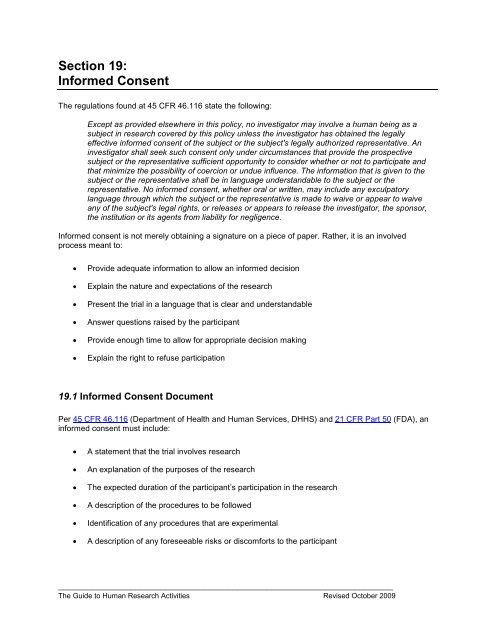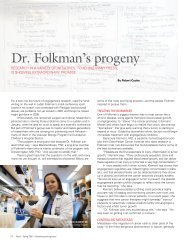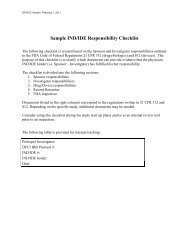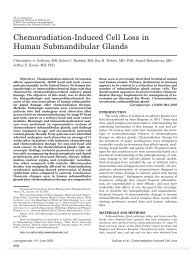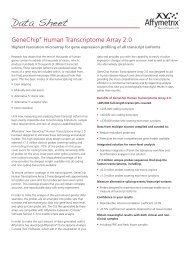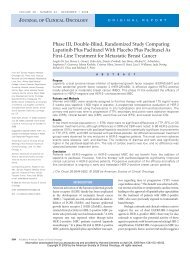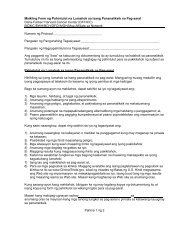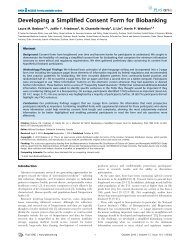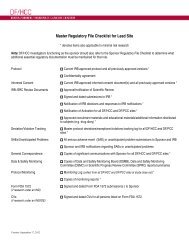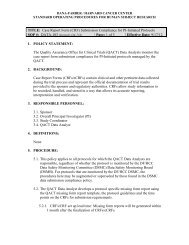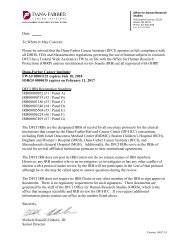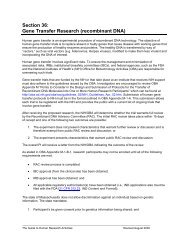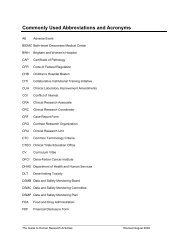19.1 Informed Consent Document 19.2 Standardized Consent Form ...
19.1 Informed Consent Document 19.2 Standardized Consent Form ...
19.1 Informed Consent Document 19.2 Standardized Consent Form ...
You also want an ePaper? Increase the reach of your titles
YUMPU automatically turns print PDFs into web optimized ePapers that Google loves.
Section 19:<br />
<strong>Informed</strong> <strong>Consent</strong><br />
The regulations found at 45 CFR 46.116 state the following:<br />
Except as provided elsewhere in this policy, no investigator may involve a human being as a<br />
subject in research covered by this policy unless the investigator has obtained the legally<br />
effective informed consent of the subject or the subject's legally authorized representative. An<br />
investigator shall seek such consent only under circumstances that provide the prospective<br />
subject or the representative sufficient opportunity to consider whether or not to participate and<br />
that minimize the possibility of coercion or undue influence. The information that is given to the<br />
subject or the representative shall be in language understandable to the subject or the<br />
representative. No informed consent, whether oral or written, may include any exculpatory<br />
language through which the subject or the representative is made to waive or appear to waive<br />
any of the subject's legal rights, or releases or appears to release the investigator, the sponsor,<br />
the institution or its agents from liability for negligence.<br />
<strong>Informed</strong> consent is not merely obtaining a signature on a piece of paper. Rather, it is an involved<br />
process meant to:<br />
<br />
<br />
<br />
<br />
<br />
<br />
Provide adequate information to allow an informed decision<br />
Explain the nature and expectations of the research<br />
Present the trial in a language that is clear and understandable<br />
Answer questions raised by the participant<br />
Provide enough time to allow for appropriate decision making<br />
Explain the right to refuse participation<br />
<strong>19.1</strong> <strong>Informed</strong> <strong>Consent</strong> <strong>Document</strong><br />
Per 45 CFR 46.116 (Department of Health and Human Services, DHHS) and 21 CFR Part 50 (FDA), an<br />
informed consent must include:<br />
<br />
<br />
<br />
<br />
<br />
<br />
A statement that the trial involves research<br />
An explanation of the purposes of the research<br />
The expected duration of the participant’s participation in the research<br />
A description of the procedures to be followed<br />
Identification of any procedures that are experimental<br />
A description of any foreseeable risks or discomforts to the participant<br />
_____________________________________________________________________<br />
The Guide to Human Research Activities Revised October 2009
A description of any benefits to the participant or to others that may reasonably be expected from<br />
the research<br />
Disclosure of appropriate alternative procedures or courses of treatment, if any, that might be<br />
advantageous to the participant<br />
A statement describing the extent, if any, to which confidentiality of records identifying the<br />
participant will be maintained, and if applicable, a statement that the FDA may inspect the records<br />
For research involving more than minimal risk, an explanation as to whether or not any<br />
compensation is available if injury occurs; whether or not any medical treatment is available if<br />
injury occurs, and if so, what they consist of; and whether or not further information can be<br />
obtained<br />
An explanation of whom to contact for answers to questions about the research, research<br />
participants’ rights, and whom to contact in the event of a research-related injury to the participant<br />
A statement that participation is voluntary, that both refusal to participate and discontinuing<br />
participation at any time can be done without penalty or loss of benefits to which the participant is<br />
otherwise entitled<br />
The following elements may also be required:<br />
<br />
<br />
<br />
<br />
<br />
<br />
<br />
<br />
A statement that a particular treatment or procedure may involve risks to the participant that are<br />
unforeseeable<br />
The anticipated circumstances under which the participant’s participation may be terminated by<br />
the investigator without regard to the participant’s consent<br />
Any additional costs to the participant that may result from participation in the research<br />
The consequence of a participant’s decision to withdraw from the research and procedures for<br />
orderly termination of participation by the participant<br />
A statement that significant new findings developed during the course of the research, which may<br />
relate to the participant’s willingness to continue, will be provided to the participant<br />
The approximate number of participants involved in the trial (since exceeding this number<br />
requires IRB review, for multi-institutional studies, the maximum number that might be expected<br />
to be accrued at DF/HCC should be used).<br />
The trial treatment(s) and the probability of random assignment to a placebo or to treatment<br />
The IRB may require that information (in addition to that required by the regulations) be given to<br />
research participants when by its judgment the information would meaningfully add to the<br />
protection of the rights and welfare of participants<br />
The consent document should be clear and descriptive enough to stand alone in describing the proposed<br />
research.<br />
_____________________________________________________________________<br />
The Guide to Human Research Activities Revised October 2009
<strong>19.2</strong> <strong>Standardized</strong> <strong>Consent</strong> <strong>Form</strong> Template<br />
All new protocols submitted to the IRB are required to use the most current consent form template. The<br />
template is designed to provide greater understanding and improve potential participants’ decisionmaking<br />
for participation in a clinical trial. The informed consent template will aid investigators in writing<br />
informed consent documents and will assist the IRB in the review of such documents.<br />
Study teams are encouraged to use the “Common Language for Risks and Events” database to draft the<br />
risks incorporated in the consent form for submission to the IRB.<br />
The template, guidelines, risk language database, and instructions may be found on the OHRS website.<br />
19.3 Incentives and Remuneration for Study Participants<br />
Each year, thousands of individuals are paid for participating in biomedical and behavioral research<br />
funded either by federal departments and agencies or private institutions. Although payments are usually<br />
monetary, both patients and normal healthy volunteers may be offered other rewards in lieu of or in<br />
addition to money.<br />
The amount and schedule of all payments should be presented to the IRB at the time of initial review.<br />
Taking into consideration the population to be recruited, and the medical, employment, and educational<br />
status, financial, emotional and community resources, as applicable, the IRB must determine whether the<br />
rewards offered for participation in research constitute undue inducement.<br />
Any credit for payment should accrue as the study progresses and should not be contingent upon the<br />
participant completing the entire study. Payment to participants who withdraw from the study may be<br />
made at the time they would have completed the study (or completed a phase of the study) had they not<br />
withdrawn. For example, in a study lasting only a few days, an IRB may find it permissible to allow a<br />
single payment date at the end of the study, even to participants who withdrew before that date. If this<br />
policy appears coercive within the context of a particular study, arrangements should be made to provide<br />
payment on a different schedule.<br />
While the entire payment should not be contingent upon completion of the entire study, payment of a<br />
small proportion as an incentive for completion of the study is acceptable. The IRB should determine that<br />
the amount paid as a bonus for completion is reasonable and not so large as to unduly induce<br />
participants to stay in the study when they would otherwise have withdrawn. All information concerning<br />
payment, including the amount and schedule of payment(s), should be set forth in the informed consent<br />
document.<br />
We recommend the following as guidance to investigators and the IRB:<br />
1. When offered, incentives should generally not exceed $20-$25 per hour or $200-$250 per day,<br />
whichever is less.<br />
2. The amount should be calculated based on the incremental time that study participants spend for<br />
research purposes.<br />
3. Incentives may be offered to patient-participants as well as to healthy volunteers.<br />
4. Incentives must be described in any advertisements and in the consent form.<br />
_____________________________________________________________________<br />
The Guide to Human Research Activities Revised October 2009
5. In addition to the incentives described above, remuneration for parking, meals, and other<br />
expenses incurred due to participation in a trial is appropriate for all study participants.<br />
19.4 Assent and Children in Research<br />
Assent is “an agreement by an individual not competent to give legally valid informed consent to<br />
participate in research.” Children, adolescents and people with mentally diminished capacity fall into this<br />
category and therefore, may be asked for their assent to participate in research.<br />
The assent process seeks to obtain an element of understanding and cooperation on behalf of the child. It<br />
also attempts to provide the child with a sense of inclusion, respect, and dignity in terms of his or her<br />
decision to take part in research.<br />
While reviewing research that includes children, the IRB must determine that adequate provisions for<br />
soliciting assent are in place. Factors such as age, maturity, and the psychological states of the children<br />
play roles in the IRB determining whether the potential subjects are capable of understanding the nature<br />
of their participation in the research.<br />
The IRB will assess the investigator’s plan for obtaining permission from parents/guardians as well as<br />
plans for obtaining assent from the children.<br />
In cases where the studies are of minimal risk to the child, the permission of one parent may be sufficient.<br />
In cases where the research presents more than minimal risk to the child but there is the prospect for<br />
direct benefit, the IRB may also find it sufficient to ask for permission from one parent.<br />
When the IRB reviews studies that involve more than minimal risk for the child and does not hold out the<br />
prospect for direct benefit but does offer an opportunity to learn more about the disease under study, the<br />
IRB will require the permission of both parents when both are reasonably available.<br />
In making this determination the IRB will work with the investigator to determine whether or not the<br />
permission of both parents should be sought, when both parents are reasonably available or when it is<br />
sufficient to obtain permission from one parent.<br />
19.5 IRB Waiver of <strong>Informed</strong> <strong>Consent</strong> 45 CFR 46.116(d)<br />
An IRB may approve a consent procedure that does not include, or that alters, some or all of the<br />
elements of informed consent set forth in this section, or waive the requirements to obtain informed<br />
consent provided the IRB finds and documents that:<br />
1. The research involves no more than minimal risk to the participants.<br />
2. The waiver or alteration will not adversely affect the rights and welfare of the participants.<br />
3. The research could not practicably be carried out without the waiver or alteration.<br />
4. Whenever appropriate, the participants will be provided with additional pertinent information after<br />
participation.<br />
5. If personal identifiable information will be collected, the following must be addressed:<br />
a. The plan in place to protect identifiers from improper use or disclosure.<br />
_____________________________________________________________________<br />
The Guide to Human Research Activities Revised October 2009
. When and how identifying information will be destroyed.<br />
c. Why the research could not be practicably conducted without access to/use of this<br />
identifiable information.<br />
NOTE: The FDA regulations do not permit a waiver of informed consent except in very limited<br />
circumstances such as in emergency situations (see 21 CFR 50.23).<br />
19.6 IRB Waiver of <strong>Document</strong>ation of <strong>Informed</strong> <strong>Consent</strong> 45 CFR 46.117(C)<br />
An IRB may waive the requirement for the investigator to obtain a signed consent form for some or all<br />
participants if it finds either:<br />
1. The only record linking the participant and the research would be the consent document and the<br />
principal risk would be potential harm resulting from a breach of confidentiality. Each participant<br />
will be asked whether they want documentation linking the participant with the research, and the<br />
participant’s wishes will govern. - or<br />
2. The research presents no more than minimal risk of harm to participants and involves no<br />
procedures for which written consent is normally required outside of the research context.<br />
In cases in which the documentation requirement is waived, the IRB may require the investigator to<br />
provide participants with a written statement regarding the research.<br />
NOTE: In accordance with 21 CRF 56.109, the FDA regulations permit a waiver of documentation of<br />
informed consent for research involving no more than minimal risk of harm to participants and involves no<br />
procedures for which written consent is normally required outside of the research context.<br />
19.7 IRB Monitoring/Auditing of the <strong>Consent</strong> Process<br />
During its review, the IRB may find protocols that require monitoring or auditing of the consent process in<br />
order to assure that participants are adequately and appropriately provided information related to their<br />
ability to make an informed decision about participation in a research study. In such cases, where the IRB<br />
determines that such monitoring or auditing is necessary the IRB will do the following:<br />
<br />
<br />
<br />
<br />
Inform the investigator that the need for monitoring or auditing the consent process has been<br />
identified<br />
Provide the investigator with the rationale behind this decision<br />
Identify the individual(s) (either IRB members or other parties) who will carry out the<br />
monitoring/auditing procedure<br />
Provide the process by which this procedure will be performed – sit in and observe or follow up<br />
with the subject to ask about his or her experience<br />
19.8 Guidelines for Obtaining <strong>Consent</strong> to Research<br />
Clinicians and investigators have an obligation to obtain the informed consent of the participant (or the<br />
appropriate surrogate) before enrolling him or her in a clinical trial. <strong>Informed</strong> consent to clinical trials<br />
_____________________________________________________________________<br />
The Guide to Human Research Activities Revised October 2009
shares much in common with informed consent to ordinary clinical care, including such key elements, as<br />
the procedures the participants will undergo, the risks of those procedures, the potential benefits of<br />
undergoing the procedures, and the alternatives to the proposed course of action.<br />
However, informed consent to research also differs in important ways from informed consent to ordinary<br />
care. These derive from the fact that the fundamental purpose of clinical trials is to gain generalizable<br />
knowledge that will advance treatment for future patients.<br />
General Guidelines<br />
When obtaining informed consent to research, the clinician/investigator should emphasize the ways in<br />
which clinical trials differ from ordinary clinical care:<br />
<br />
<br />
<br />
Clearly identify one or more non-research alternatives to the clinical trial (including palliative care,<br />
where appropriate).<br />
Clearly identify the incremental risks and benefits of the clinical trial, compared with the nonresearch<br />
alternative(s).<br />
Clearly identify the uncertainty associated with the experimental treatment under investigation.<br />
Timing of <strong>Consent</strong><br />
Evidence shows that participants who have time to consider their decisions and review the consent form<br />
are better informed than those who do not. Therefore, unless there is a strong reason to obtain consent at<br />
the first conference (i.e., medical urgency), clinicians/investigators are strongly encouraged to give<br />
participants at least 24 hours to consider their decision before obtaining signed consent.<br />
Participants in the <strong>Consent</strong> Process<br />
Evidence also shows that the participation of a professional third party in the consent process is<br />
associated with improved understanding. Whenever possible, clinicians/investigators are urged to include<br />
a nurse, psychosocial clinician, or other member of the study team in consent conferences.<br />
Reading the <strong>Consent</strong> <strong>Form</strong><br />
Clinicians/investigators should strongly encourage potential participants to read the consent form carefully<br />
before deciding about participation.<br />
Requirements for <strong>Informed</strong> <strong>Consent</strong>, as stated in 45 CFR 46.116<br />
An investigator must seek consent only under circumstances that provide the prospective participant or<br />
the representative sufficient opportunity to consider whether or not to participate and that minimize the<br />
possibility of coercion or undue influence.<br />
Legally Authorized Representative<br />
The IRB defines the legally authorized representative as a court appointed representative or an individual<br />
named as a health care proxy to make decisions for another individual about participation in research.<br />
This means the person who possesses the legal and rightful power to act for or on behalf of another.<br />
_____________________________________________________________________<br />
The Guide to Human Research Activities Revised October 2009
The information that is given to the participant or the representative must be in a language<br />
understandable to the participant or the representative.<br />
No informed consent, whether oral or written, may include any exculpatory language through which the<br />
participant or the representative is made to waive or appear to waive any of the participant's legal rights,<br />
or releases or appears to release the investigator, the sponsor, the institution, or its agents from liability<br />
for negligence.<br />
19.9 Instructions for Obtaining and <strong>Document</strong>ing <strong>Informed</strong> <strong>Consent</strong> of Non-<br />
English-Speaking Participants<br />
The federal regulations require that informed consent information be presented “in a language that is<br />
understandable to the subject.” Discussions with participants who are not fluent in English about their<br />
participation in the trial should be conducted with a translator. The translation services should be<br />
arranged ahead of time, if possible. Translator may be a member of the study team, but should not be a<br />
family member.<br />
There are currently two accepted procedures for obtaining consent from non-English speaking study<br />
participants.<br />
Federal regulators and the DFCI IRB strongly encourage the use of these procedures whenever<br />
possible.<br />
1. If a study team plans on enrolling non-English speaking study participants, the entire consent<br />
document must be translated into a language understandable to the participants. The translated<br />
document must be approved by the IRB. This is typically done at the time of initial IRB review.<br />
<br />
The participant (or legally authorized representative), translator, and person obtaining<br />
informed consent must sign the translated version of the consent.<br />
2. Investigators cannot always anticipate the interest of a particular non-English speaking individual<br />
and therefore may not be able to obtain an IRB-approved translated consent document in a timely<br />
manner. In such cases, the regulations do permit the use of a “short form.” The short from is<br />
written in a language understandable to the participant and outlines what he or she must be told<br />
by the investigator during their discussion about his or her participation in the trial.<br />
<br />
<br />
<br />
<br />
The short form must be accompanied by a written summary of what is presented orally<br />
(the IRB-approved English language consent document may serve as the written<br />
summary). The participant must be given copies of both.<br />
The translator must orally present the English language consent form.<br />
The participant (or legally authorized representative) and the witness* should sign the<br />
short form.<br />
The person obtaining consent and the witness* should sign the summary (or English<br />
language consent document).<br />
*An individual who is fluent in both English and the language understandable to the participant must<br />
witness the entire consent process. The translator may serve as the witness.<br />
The consent process must be appropriately documented in the participant’s medical/research record.<br />
_____________________________________________________________________<br />
The Guide to Human Research Activities Revised October 2009
OHRS currently has short forms available in various languages on the OHRS website.<br />
For further information, please visit the following links:<br />
FDA: Guide to <strong>Informed</strong> <strong>Consent</strong>, Non-English Speaking Subjects<br />
http://www.fda.gov/oc/ohrt/irbs/informedconsent.html#nonenglish<br />
OHRP: Obtaining and <strong>Document</strong>ing <strong>Informed</strong> <strong>Consent</strong> of Subjects Who Do Not Speak English<br />
http://www.hhs.gov/ohrp/humansubjects/guidance/ic-non-e.htm<br />
<strong>19.1</strong>0 Instructions for Obtaining and <strong>Document</strong>ing <strong>Informed</strong> <strong>Consent</strong> of Illiterate<br />
Participants<br />
Investigators and research staff must ensure open and effective communication between themselves and<br />
potential study participants. When attempting to obtain informed consent from illiterate individuals, this<br />
may prove to be especially challenging.<br />
If the individual is unable to read and/or write but can otherwise communicate and/or comprehend, the<br />
entire IRB-approved consent document must be read to the individual. He or she must then be given the<br />
opportunity to ask questions. A neutral third party must observe the entire consent process. The neutral<br />
third party should sign the consent document (regardless of a witness signature line) and write that the<br />
signature documents observation of the entire review of the consent form, the discussion of the research<br />
and its risks and benefits and the individual making his/her mark or signature.<br />
If the individual does not speak English, the translated short form should be used in the same manner as<br />
described above. The participant must receive a copy of the short form and the entire IRB-approved<br />
English version.<br />
The appropriate notes regarding the consent process and copies of the signed documents should be<br />
maintained in the study file.<br />
<strong>19.1</strong>1 Guidelines for the Protection of Cognitively Impaired Persons Involved in<br />
Research<br />
See Research Involving Cognitively Impaired Persons in the Vulnerable Population section of this guide.<br />
<strong>19.1</strong>2 Guidelines for <strong>Consent</strong>ing the Pregnant Partners of Study Participants<br />
If information will be collected on partners of participants who become pregnant, and the sponsor wishes<br />
to collect information on the pregnancy, delivery and baby, then a separate research consent form must<br />
be submitted for IRB review. The consent must include all the required elements of consent and describe<br />
why the information will be collected, what information will be collected, and with whom it would be<br />
shared. This information must also be explained in the protocol document.<br />
<strong>19.1</strong>3 DF/HCC <strong>Consent</strong> <strong>Form</strong> Footer<br />
_____________________________________________________________________<br />
The Guide to Human Research Activities Revised October 2009
The following footer is placed on every consent form when it is posted on the Oncology Protocol System<br />
(OncPro). Study team members should always refer to OncPro before consenting a new study participant<br />
to download the most current version of the consent document. Saving the consent form to a desktop or<br />
making numerous copies is not recommended and could result in a participant signing an outdated<br />
version. Below is a description of each of the elements within the footer:<br />
DFCI IRB Protocol Number: TBD<br />
Date Posted for Use: TBD<br />
Date DFCI IRB Approved this <strong>Consent</strong> <strong>Form</strong>: TBD<br />
Date DFCI IRB Approval Expires: TBD<br />
The date the most current version<br />
of the protocol/consent is posted<br />
online for use.<br />
This date represents the day before<br />
IRB approval expires. On this day,<br />
the consent form will be removed<br />
from OncPro in the event of IRB<br />
expiration.<br />
_____________________________________________________________________<br />
The Guide to Human Research Activities Revised October 2009


